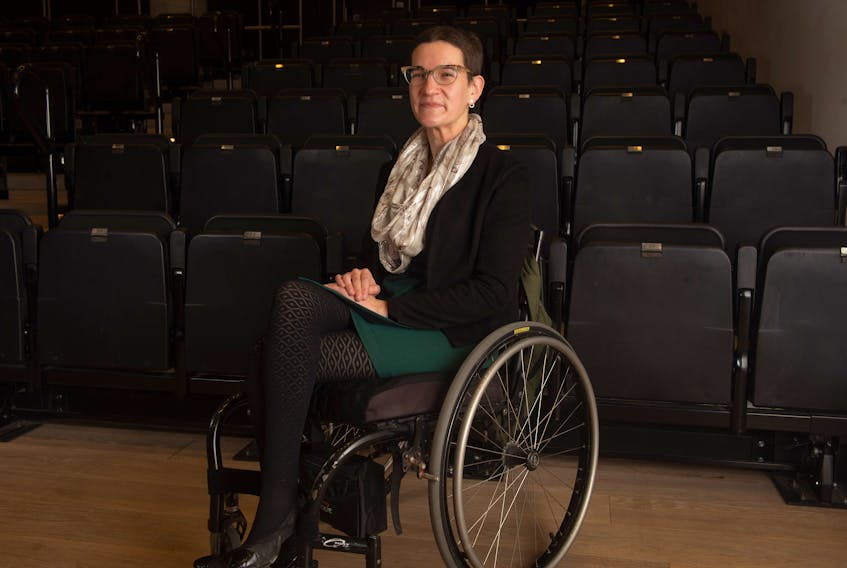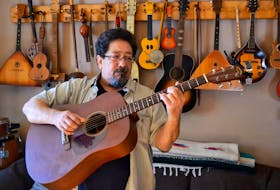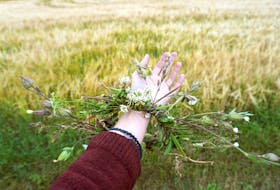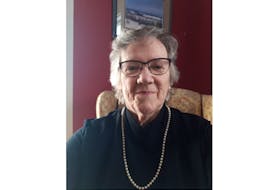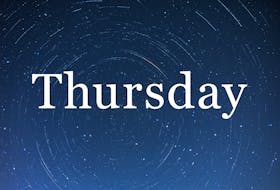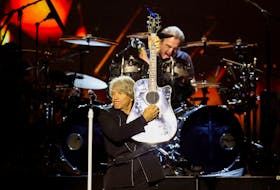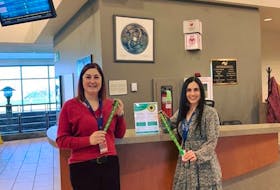Acting as the official ambassador for 2020’s combined National AccessAbility Week and the Bluenose Ability Arts & Film Festival, running May 31 to June 6 in Halifax and Dartmouth, is not a role April Hubbard takes lightly.
As a person with ongoing mobility issues and a prominent arts supporter and participant, she sees next year’s combination of NAAW events geared towards increasing visibility, accessibility and inclusion for those with disabilities, and an expanded BAAFF exploring aspects of creativity beyond its original film fest mandate, as a perfect storm for her.
Hubbard has forged her own path in the arts, rising from volunteer to chair of the Halifax Fringe theatre fest over the past 16 years and undertaking training and performances with the progressive Legacy Circus troupe.
Hubbard discussed her ingrained love of the arts, and how her desire to be on stage was curtailed by a spinal cord disorder that led her to require forearm crutches, and eventually a wheelchair, at the official announcement of 2020’s NAAW/BAAFF program by Nova Scotia’s reachAbility Association at Halifax Central Library on Tuesday.
“Nobody would hire me anymore, they told me I would be distracting to the audience, so I really lost that connection of being in front of an audience and having that feed my soul,” says Hubbard, who feels like the expanded BAAFF with its broader focus on theatre, music and comedy, as well as accessibility in the arts in general.
“There are so many different ways that we can make arts, and there are a lot of people already doing it in the community that we want to bring together.”
BAAFF highlights will include sessions on the What Happened to Holly Bartlett? podcast, music therapy with Anna Plaskett, improv theatre with Gil Anderson and Tee Johnny, the Because I Have a Voice hip-hop event, and films like the Himalayan feature Chuskit, about a determined paraplegic girl who bucks family tradition when she wants to go to school.
Hubbard joins BAAFF’s author-in-residence, Canadian-born, Isreal-based author Anna Levine, and emerging artist Leah Gonsalves as an active face of the festival, and will be spending the week taking part in panels, attending screenings of local and international shorts and features and hosting the Because I Can ... LAUGH night of comedy at the Oasis.
“BAAFF has always been really important to me, because it’s about people with disabilities who get to tell their own stories and really lead the narrative and say what they want to say about their own lives, which often doesn’t happen in the media and in our culture in general,” says Hubbard.
“In general, we often see disability stories being told by able-bodied folks, but when we get to control what we want to tell and what’s important to us — and the path that story will take — it’s really rewarding and important to us and the disability community as a whole.”
Hubbard is also looking forward to NAAW events like a panel on accessibility in academia, a group of films on disability and sports, and a screening and panel centred around the documentary Take a Look at This Heart, about dating and sexuality for those with mobility disabilities.
She also expects to be discussing the improvements she’s seen in increasing access to the arts, with more venues making the effort to become wheelchair accessible, “but there’s a lot further that we can go.”
There has been progress, most notably the rise in relaxed performances for those with sensory sensitivities, but she still sees room for improvement in the need for ASL interpretation, sighted guides and other forms of accessibility assistance.
But most importantly, she’s eager to experience what BAAFF will do for the artists themselves in terms of getting their work seen, and being included in the broader community of performance and exhibition.
“It often feels like, ‘You’re allowed to be part of the audience, but we don’t really want you to participate yet, we don’t want you to become part of the community.’ That’s one area that I’m really pushing hard in, as somebody who started in the community as an able-bodied person,” says Hubbard.
“I’ve been kind of holding on with a tight grip, trying not to lose that and really fighting, and helping to bring other people along as well. We still have voices and we still have stories, and our connection to our own experiences and the tough challenges we’ve been through really deepens our art.”
For her own part, Hubbard plans to continue deepening her involvement with Legacy Circus, the Halifax/Kingston-based company which incorporates mobility aids and non-traditional circus apparatuses into its performances all over the world.
So far she’s taken part in four professional shows with Legacy and is pursuing further training as a circus artist, resulting in a personal enrichment that goes beyond that desire to be visible to an audience on stage.
“Being able to find that again now with circus arts has been truly amazing and it’s really given me a creative voice back that I didn’t have. And it’s really enabled me to connect to my body even more and find strength that I thought I had lost,” she says.
“Being able to train those muscles, know how to work with my body and read its signals, I’ve been able to start walking again for the first time in years, which has been truly amazing.”

